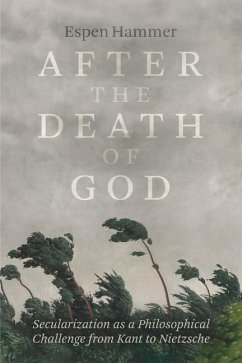"The classical secularization thesis that emerged during the European Enlightenment held that all expressions of belief would gradually weaken and fade away under the pressure of scientific and technological rationality. Yet religious belief has persisted and thrived under the conditions of modernity. In After the Death of God, philosopher Espen Hammer reconstructs and analyzes a discourse of secularization that accounts for this incongruity. Starting from Immanuel Kant, Hammer explores how philosophers have responded to the death of God, focusing on the idealist and anti-idealist aftermath of Kant's thinking in Hegel, Feuerbach, Marx, and Nietzsche. For these philosophers, the Enlightenment critique of rational metaphysics was either articulated, affirmed, or simply taken for granted. However, the absence of God, or at least the impossibility of knowing whether a divine power exists, was not simply a mere fact. Rather than searching for reasons to reject religion, Hammer finds, these thinkers have called for a diagnostic and interpretive account of religion's ultimate significance and role within the context of modernity. Unlike today's New Atheists, who see religion as fundamentally anti-modern, the thinkers in this book all see religion as being either transformed into, or replaced by, a renewed ethical life. For them, the claim that "God is dead" implies the beginning of a secular age in which humans attain dignity and moral authority as a self-actualizing, self-creating being"--
Hinweis: Dieser Artikel kann nur an eine deutsche Lieferadresse ausgeliefert werden.
Hinweis: Dieser Artikel kann nur an eine deutsche Lieferadresse ausgeliefert werden.

